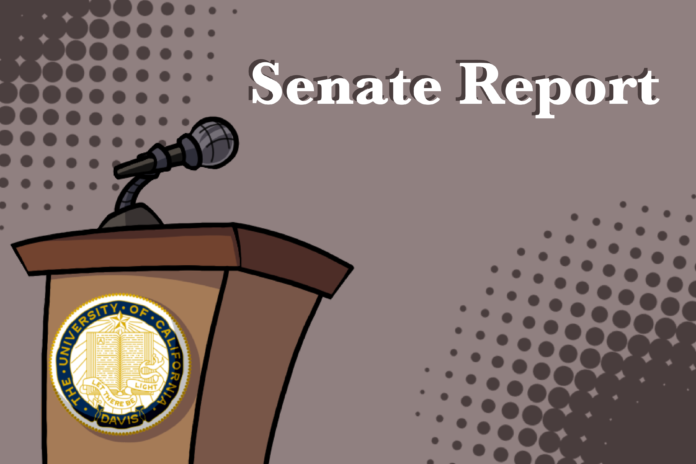The resolution requests that dining services provide more options for students and asks faculty to factor in potential sleep disruption or scheduling conflicts when taking attendance
Senator Kabir Sahni called the April 15 ASUCD Senate meeting to order at 6:10 p.m. in the absence of Vice President Emily Barneond.
Senator Maahum Shahab introduced emergency legislation Senate Resolution #12, requesting faculty members and staff to accommodate Muslim students observing Ramadan, which runs through the middle of the Spring Quarter, from April 12 to May 12 this year.
“We just want to remind professors and admin again that it’s Ramadan and students may need just a little bit of accommodations when it comes to synchronous classes and things like that,” Shahab said. “From personal experience, it’s tough. As much as I love the beautiful community feeling during Ramadan, it takes a huge toll.”
The resolution requests faculty to be thoughtful in marking attendance for students observing Ramadan due to the fasting requirements of the Muslim holiday as well as recognizing some student’s sleep disruption due to waking up before or staying up until dawn to eat.
The resolution also asks Food Services to be aware of food restrictions and that Halal food be available for Muslim students. It also requests an extension of dining services to 8:30 p.m after sundown.
“Obviously fasting takes a toll on someone’s ability to perform in academics, so they should have that accommodation,” said Yalda Saii, the chair of the Ethnic and Cultural Affairs Commission (ECAC).
The resolution passed unanimously.
UC Davis is facing a potential $200 million deficit if no action is taken to mitigate the funding gap, according to the Campus Budget and Institutional Analysis presented by Laurie Carney, the assistant director of the Budget Office, and Sarah Mangum, the assistant vice chancellor and budget director.
The presentation showed that at its current funding rate, UC Davis will be unable to pay for current employees’ salary and benefits through its core funding.
Core funding consists largely of student and family contributions through enrollment. Cost-saving adjustment measures will need to be made over the next four years to compensate.
“Back in 2010, students started supporting our operations more than the state—students and their families,” Mangum said.
Since the state had a reduction in funding allocated to the university this year, there is a larger gap between what is funded by students and their families and what is funded by the state, according to Magnum.
“I will also say these are projections based on assumptions, that’s what we budget people do,” Mangum said. “We might be a little conservative; we try not to be too conservative but be realistic as well.”
Mangum said that they will be looking at more options for funding than just cuts, such as endowments or philanthropic contributions, so that they have minimal impact on the student experience. Magnum added that the budget reduction plan was not related to COVID-19.
Senate Bill #71, which passed unanimously, established a Research and Data Committee.
“It’s honestly a very much needed piece of legislation,” said Internal Affairs Commission Chair Julian Garcia. “We thought it was a really good idea to set up a committee that tries to consolidate all the research and data efforts within the association.”
Senate Bill #77, which also passed unanimously, renames the previously known “Davis Housing Discrimination Committee” to the “Aggie Housing Advocacy Committee” and increases the breadth of advocacy activities related to housing.
“The purpose of the committee is to do what the commission was meant to do: be a body that’s meant to uplift the voices of students when it comes to housing,” Shahab said.
Written by: Kathleen Quinn — campus@theaggie.org










